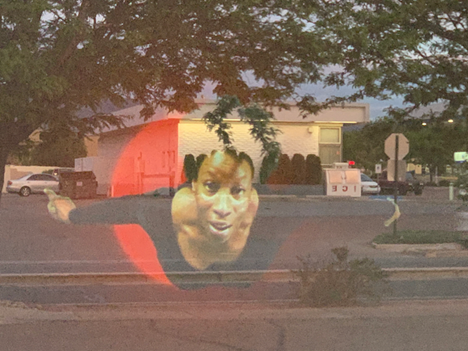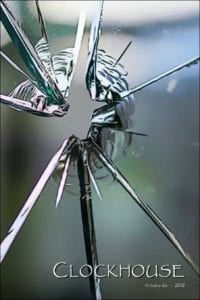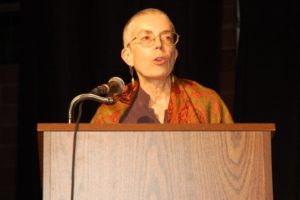
Many thanks for the wonderful response to Clockhouse Volume Five–here are a few more excerpts! To learn more about Clockhouse and its contributors, to purchase past and current copies, and to submit work for next summer’s Volume Six, please visit the Clockhouse website (www.clockhouse.net).
Excerpts from Volume Five, 2017
from Helene Barker Kiser’s Bathsheba, to Her First Child:
The moment I tilted my face to the sun,
hot, even sinking, I felt the king.
Or rather, felt eyes sharp as a crow’s.
Heat like touch, like a wall
of film around me, a substance, heat
of his hands but not his hands.
My body a fever—
blood-red bloom of a cactus—
the bath water evaporated,
surprised by the burn.
Strangely calmed by the attention,
I loved the early evening,
the beginnings of shadows. The sun,
I thought it the sun still,
unrelenting. I didn’t know
there were men around, the war
raging on. I didn’t know
there was something the king had to do.
from Sabina Murray’s Elephant Hunting:
As I watched the elephant, hearing the gentle flapping of its ears, it seemed a good time for a cigarette, although the smoke might have alerted the elephant to our presence. I gave Daxton a look frank with concern. He responded with a nervous toothy grin and raised his finger to his lips. I had wanted to see an elephant and he was showing me one. Earlier in the excursion we had come upon a buffalo carcass, well cleaned but also recently expired, and he had inquired if I would like to see a lion. I responded, “No, not really.” I had wanted to see a lion, but, when Daxton—in his routine recital of the safety protocols—informed me that when confronted by lions the best thing to do was to stay absolutely still so they would “not think you’re food,” I had changed my mind.
from Yvette A. Schnoeker-Shorb’s My Husband Says I Need to Start Reading Novels Again:
I just mailed my DNA to Portland
where a lab will determine once
and forever whether or not I have
a mutant gene; by chance or design,
with life so defined, I can’t help
but wonder what innate sense
of fate drives this mind of mine
to know if somewhere there
dwelling in the center of my cells
with their chromosomes capped
by dutiful telomeres, within
those twisted strands hiding
and curled securely at my core,
a nucleobase is misbehaving
from Paisley Rekdal’s Atlas Moth:
Pinned, it slides on its wood tray out
from the museum’s chilled row
of cabinets: fragile, vivid
with a name that means
less each year to the crowds
who come to visit it: lovers
of myths but not readers
of them, most can’t imagine why
the great wings with their thumb-
prints of gold that can trick us
like eyes should be named
for the titan able to trick Hercules
into taking up the sky
so that he might fetch himself
golden apples, seizing
a release he thought
he’d never have and so
how beautiful the seconds
from David Myers’ Shot at Midnight:
(KAREN turns off the heat. The moka pot stops bubbling.)
30 years after Pavoni showed the world what coffee could be, Bialetti invents the moka pot. They say he was inspired by a laundry machine, which pumps hot water up through a pipe into a basket of clothes. All of a sudden, anybody in the world could have an espresso. Even me.
(mother voice)
“Karen! You’re a disappointment. You’re never going to amount to anything!”
(beat, to herself)
(mother voice)
“Karen! Your brothers are better than you. They have money, family, children. You live with your mother!
(beat)
And even she doesn’t like you very much!”
(to audience)
Thanksgiving is a special time of year. My brothers come to visit. They bring their wives, children. It’s really . . . it’s really very special. I get nervous beforehand though. I wake up in the middle of the night. The only thing that makes me feel better is coffee. I know it probably doesn’t help with the nerves, but I’m just a dumb goat, I guess. I want to jump.
(KAREN puts a glass measuring cup on the counter in front of her and a bowl of sugar. She puts two scoops of sugar into the measuring cup, then puts a few tiny drops of espresso from the moka pot into the sugar. She whips these together with great vigor.)
One way to tell if an espresso is any good is the crema. It’s a layer of bean fat mixed with air that turns into this beautiful honey-colored foam on top of the coffee.
Moka pots don’t make crema.
(Re: the whipping of sugar)
So I do this. It’s a workaround invented by the Cubans. You whip sugar with a tiny tiny amount of espresso and make something called espuma.
(She whips.)
They say that contents under pressure can transform into something beautiful. From coal into diamond.
(mother voice)
“Karen, you piece of shit! When are you going to tell your brothers the truth?”
(beat, to herself)
There’s no such thing as truth.
(mother voice)
“Yes there is!”
(beat)
My mother is dead.
Obviously.
I’m mean, I’m standing here making coffee talking to myself. Have you ever done that?
(some kind of voice of the audience.)
“Yes, Karen, of course I have.”
from Samina Hadi-Tabassum’s The Girl with the Pearl Jhumka:
The indigo heat from bruised flesh
The taste of curdled blood in my mouth
Is what I remember from that night
Waking up with a swollen violet eye
Not able to even cry in the starched corners
Staring for hours at the cracked ceiling
Fist to face . . . pump pump pump
Fist to eye . . . pump pump pump
Fist to mouth . . . pump pump pump
I see myself winding back into that Vermeer portrait
My headscarf pulled back behind my ears
The gaudy jhumka earring dangling like a pear
Polished 22 karat gold with Hyderabadi pearls
Says my mother while handing me the jewelry
Getting ready for another late night dawat
from Clifford Thompson’s 2014:
- Is it uniqueness I fear, or its opposite?
See me so long ago now, in those earliest college days, eighteen and black and knowing nothing, randomly placed in a dorm among so many whites. See me hanging with them, dancing with them, dating one, then another—and see the cool looks from the black students, on their way to or from African Heritage House, there to make my ears smolder like charcoal going from black to white . . . I feel the distance between us, feel a duty to traverse it, resent the duty, question the duty, why this duty? What have I done wrong? Nothing, I say. The distance remains. As always, there are exceptions.





